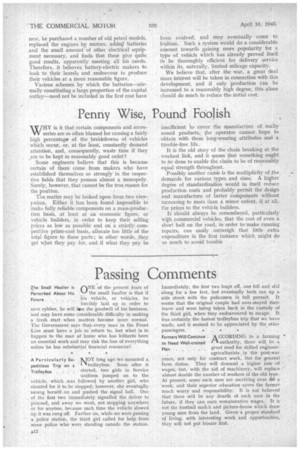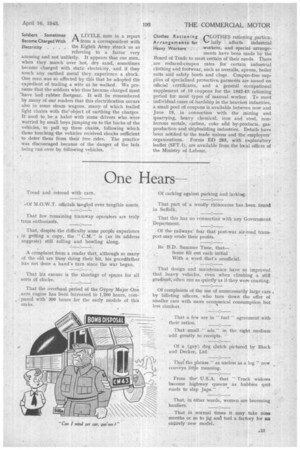Passing Comments he Small Haulier is n NE of the present
Page 14

Page 15

If you've noticed an error in this article please click here to report it so we can fix it.
fears of Perturbed About His the small haulier is that if Future his vehicle, or vehicles, be forcibly laid up in order to save rubber, he will lose the goodwill of his business, and may have some considerable difficulty in making a fresh start when matters become more normal. The Government says that. every man in the Front Line must have a job to return to, but what is to happen to the man at home who has hitherto been on essential work and may risk the loss of everything unless he has substantial financial resources?
A Particularly ExTsJOT long ago we mounted a peditious Trip on a iltrolleybus. Soon after it Trolleybus . . . started, two girls in Service
uniform jumped on to the , vehicle, which was followed by another girl, who shouted for it to be stopped; however, she eventually
• swung herself -on and pushed the signal bell. One of the first two immediately signalled the driver to proceed, and away we went, not stopping anywhere or for anyone, because 'each. time the vehicle slowed .up it was rung off. Farther on, while we we're passing a police station, the third girl called for help from some police who were standing outside the station.
Al2
Immediately, the first two leapt off, one fell and slid along for a few feet, but eventually both ran up a side street with the policemen in full pursuit.seems that the original couple had over-stayed teir leave and were being taken back in the tustody of the third girl, when they endeavoured to escape. It ivas certainly the fastest trolleybus trip that we have made, and it seemed to be appreciated by the othei passengers.
Farmers Will Continue A CCORDIgG to a farming to Need Well-trained Men -1-1 authority, there will be a
great need for skilled engineer=
agriculturists , in the post-war years, not only for contract work, hut for general farm duties. They will demand a higher rate of wages, but, with the aid of machinery,. will replace " all-host double the number of workers of the old type. At present, some such men are receiVing over Efi a 'week, and their superior education saves the farmer tnuch worry and responsibility. It is not believed that there will be any dearth of such men in the future, if they c‘an earn remunerative wages. It is not the football match and picture-house which draw young men from the land. Given a proper standard of' living, with interesting work and opportunities, they will not put leisure first. ALITTLE note in a report from a correspondent with the Eighth Army struck us as referring to a factor very amusing and not 'unlikely. It appears that our men, when they march over hot, dry saud, sometimes become charged with static electricity, and if they touch any earthed metal they experience a shock. One man was so affected by this that he adopted the expedient of trailing a wire as he walked. We presume that the soldiers who thus became charged must have had rubber footgear. It will be remembered by many of our readers that this electrification occurs also in some steam wagons, many of which trailed light chains with the object of earthing the charges. It used to, be a habit with some drivers who. were worried by small boys jumping on to the backs of the vehicles, to pull up these chains, following which those' touching the vehicles received shocks sufficient to deter them from their free rides. The practice was discouraged because of the danger of 'the lads being run over by following vehicles.
Soldier Sometimes Become Charged With Electricity . . . •
CLOTHES rationing particularly affects industrial workers, and special arrangements have been made by the Board of Trade to meet certain of their needs. There are reduced-coupon rates for certain industrial clothing and footwear, such as overalls, aprons, boiler suits and safety boots and clogs. Coupon-free supplies of specialized protective. garments are issued on official certificates, and a general occupational supplement of 10 coupons for the 1942-43 rationing period for most types of manual worker. To meet individual cases of hardship in the heaviest industries, a small pool of coupons is available between now and June 19, in connection with the mining and quarrying, heavy chemical, iron and steel, nonferrous metals, carbon, coke ad by-products, gasproduction and shipbuilding industries. Details have been notified to the trade unions and the employers' organizations. Fonns ED 283, with explanatory leaflet (SFT.1), are available from the local offices of the Ministry of Labour.
Clothes Rationing Arrangements for Heavy Workers .




















































